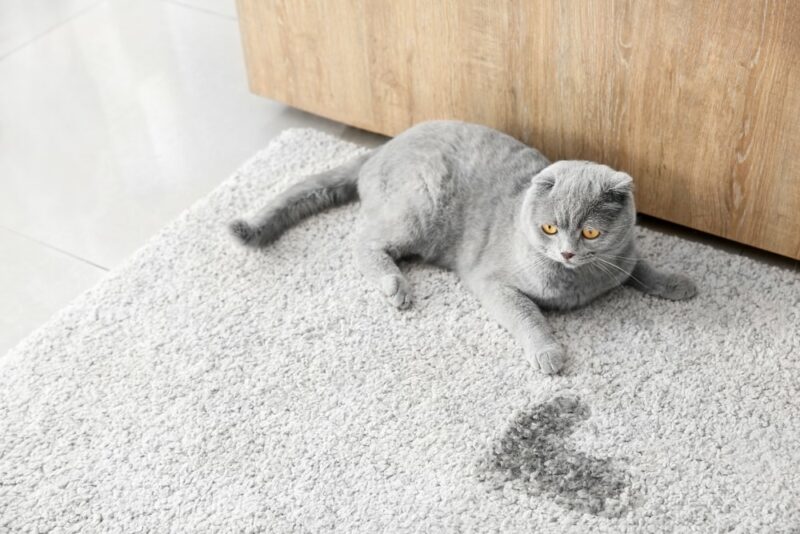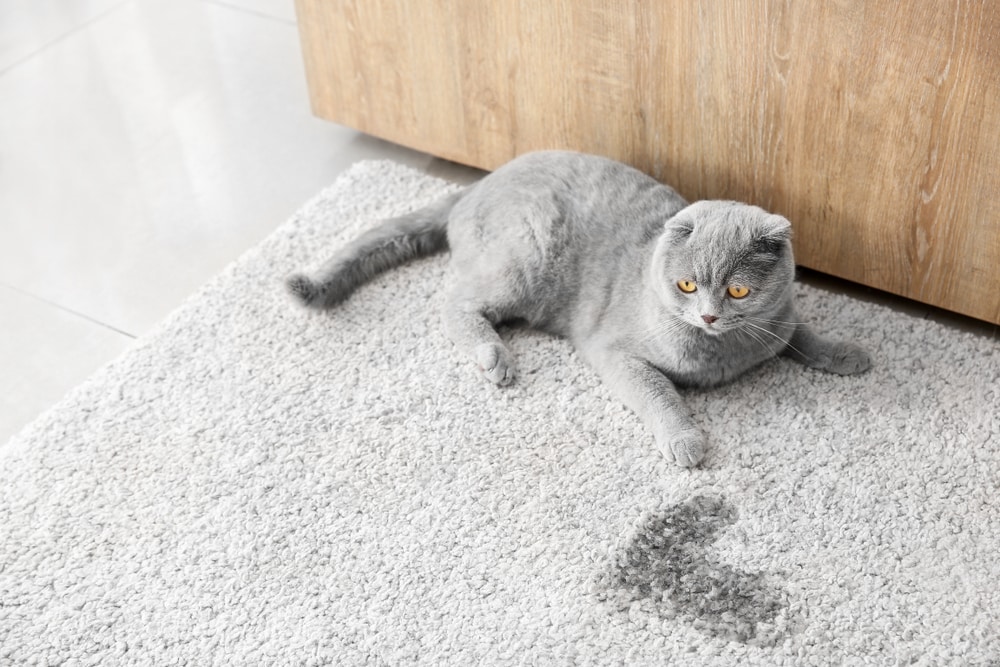
Enzyme cleaners are marketed as pet urine, stain, and odor removers, and are very easy to find both online and in stores. In this guide, we’ll share some of the bestselling and most highly reviewed urine and odor removers on the market.
A Quick Comparison of Our Favorites of 2024
| Image | Product | Details | ||
|---|---|---|---|---|
| Best Overall |
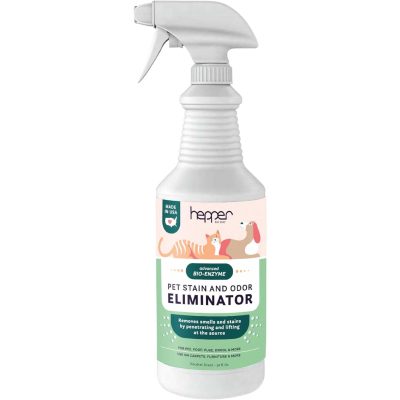
|
Hepper Advanced Bio-Enzyme Pet Stain & Odor Eliminator |
|
CHECK PRICE |
| Budget Buy |
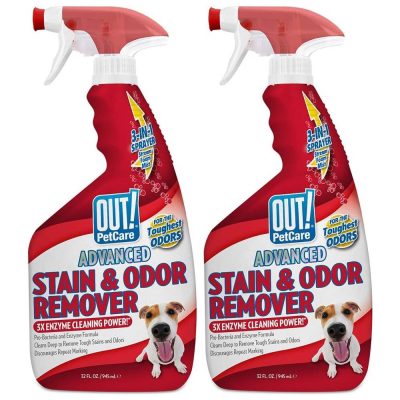
|
OUT! PetCare Advanced Stain & Odor Remover (2-Count) |
|
CHECK PRICE |
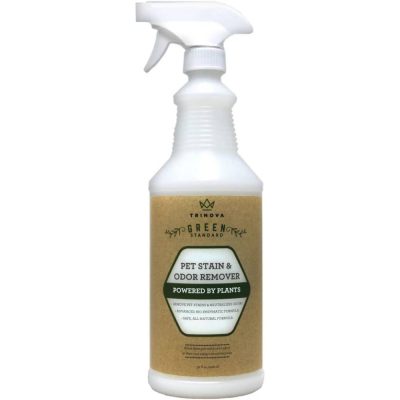
|
TriNova Pet Stain & Odor Remover |
|
CHECK PRICE | |
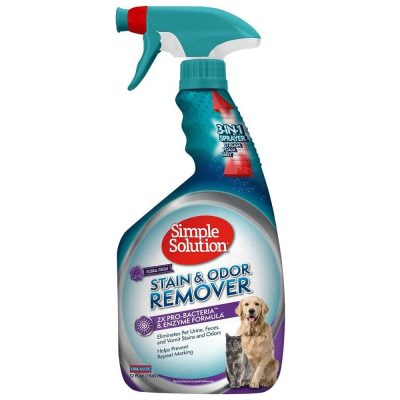
|
Simple Solution Pet Stain & Odor Remover |
|
CHECK PRICE | |
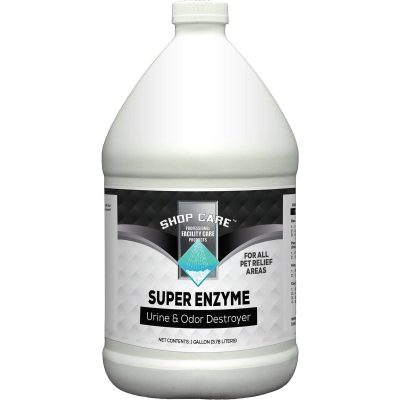
|
Shop Care Super Enzyme Pet Urine & Odor Destroyer |
|
CHECK PRICE |
The 10 Best Cat Urine & Odor Removers
1. Hepper Advanced Bio-Enzyme Pet Stain & Odor Eliminator – Best Overall
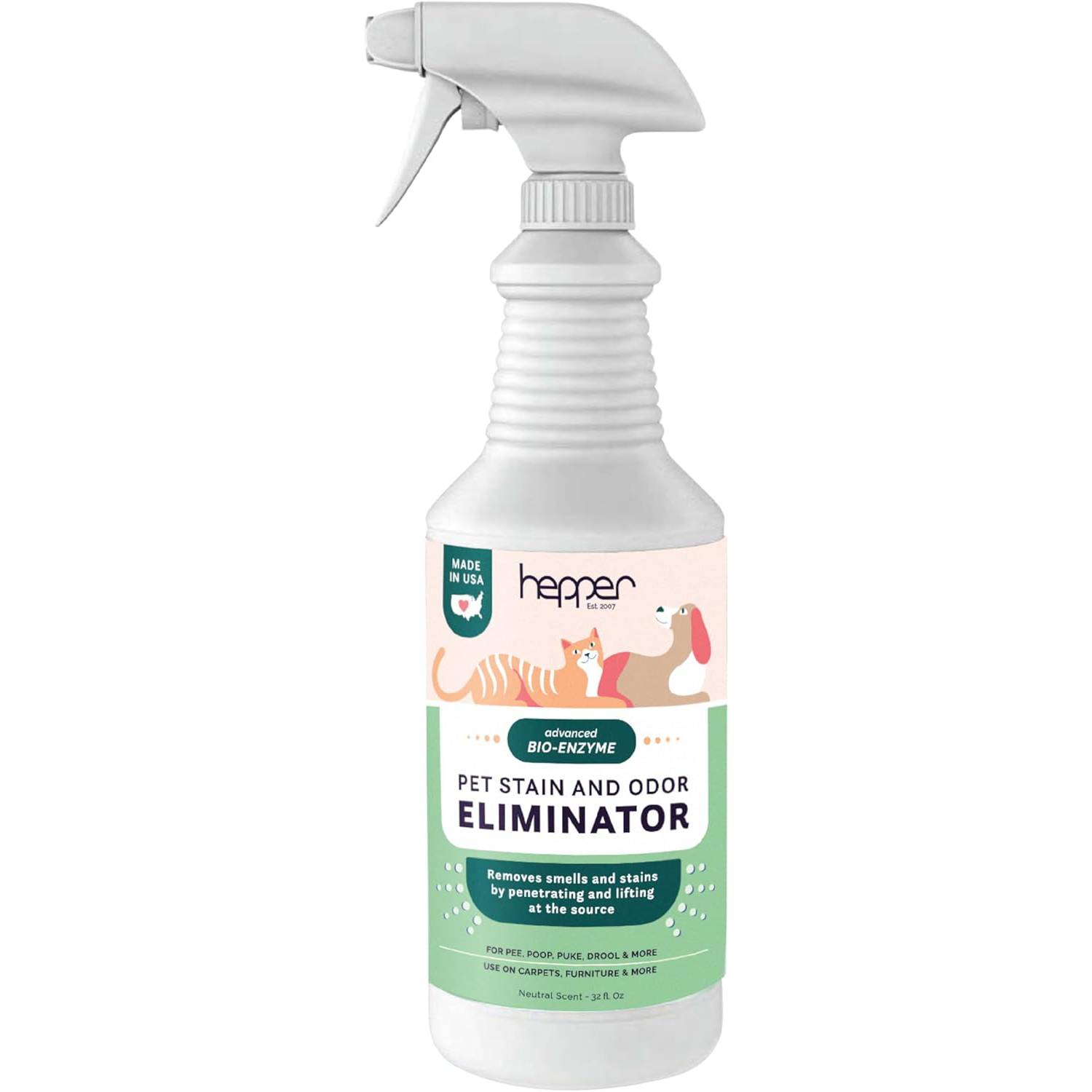
| Bottle size: | 32 oz |
| Scent: | Neutral |
| Suitable for: | Carpets, floors, fabrics, furniture, car seats, wood & more |
The Hepper Advanced Bio-Enzyme Pet Stain & Odor Eliminator spray is our best overall cat urine and odor remover for a few reasons. This neutrally-scented spray is formulated to work with urine, drool, poop, and vomit on just about any surface, including bedding, car seats, fabrics, furniture, wood, floors, and carpets, and is also good for simply freshening up areas that have an “off” smell.
We particularly like the multipurpose use and convenience of this product. No mixing with water or scrubbing is necessary—for most areas, all you need to do is shake, spray, and wait for it to dry. In general, users have been suitably impressed by its efficacy, though it’s not the cheapest option out there.
At Catster, we’ve admired Hepper for many years and decided to take a controlling ownership interest, so that we could benefit from the outstanding designs of this cool cat company!
- Neutral scent
- Works on various surface types
- No mixing or scrubbing required
- May be considered pricey
2. OUT! PetCare Advanced Stain & Odor Remover (2-Count) – Budget Buy
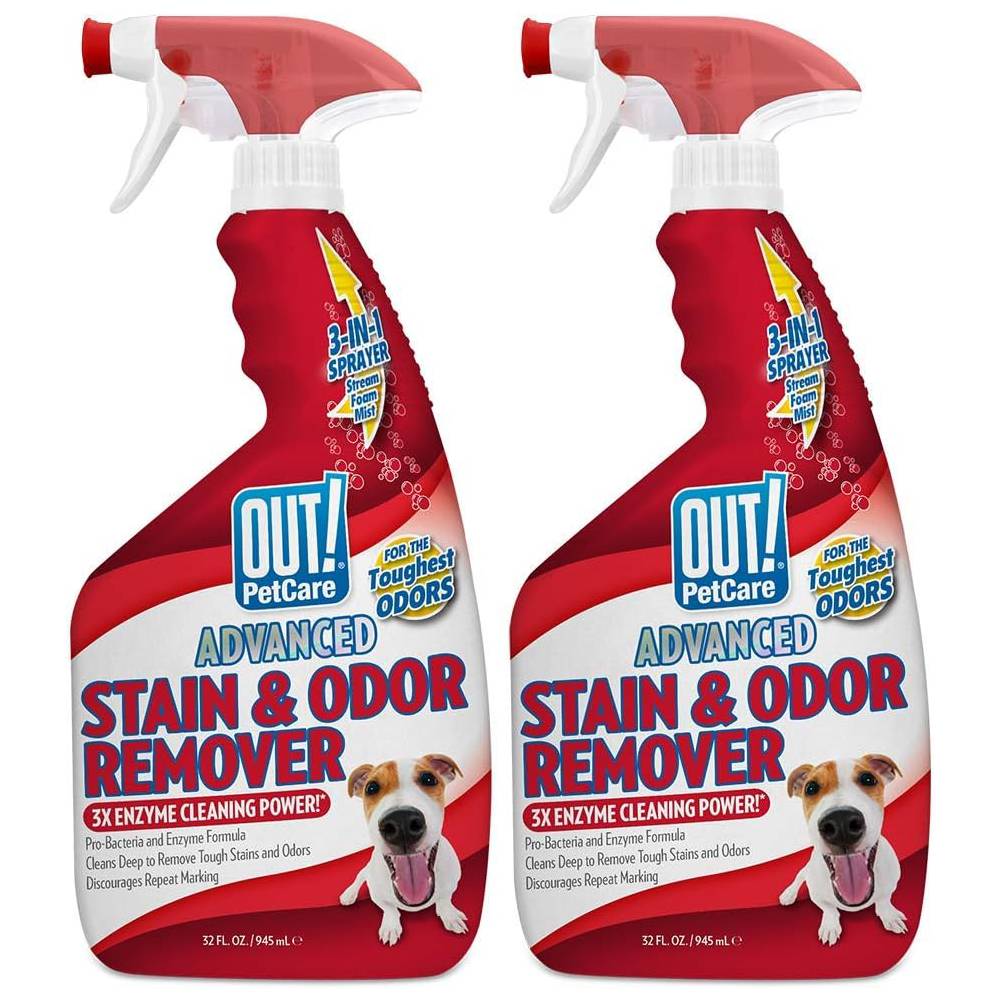
| Bottle size: | 32 oz |
| Scent: | Mild |
| Suitable for: | Carpets, upholstery, bedding, clothing, water-safe surfaces |
We consider the OUT! PetCare Advanced Stain & Odor Remover spray is a good stain and odor eliminator if you’re on a budget because you get two 32-ounce bottles at a reasonable price. Better yet, the sprayer has a 3-in-1 function—mist, foam, and stream.
The brand uses its 3X Pro-Bacteria and Enzyme formula to tackle stubborn stains and smells and remove pheromones to help discourage pets from going back to the same spot to pee. It’s designed to work on both old stains and new ones. The majority of users left glowing feedback for this spray, but it’s not a good choice for you if you plan to use it on wool, silk, or leather.
- Affordable
- 3-in-1 sprayer
- Tackles tough stains and smells
- Can’t be used on wool, silk, or leather
3. TriNova Pet Stain & Odor Remover
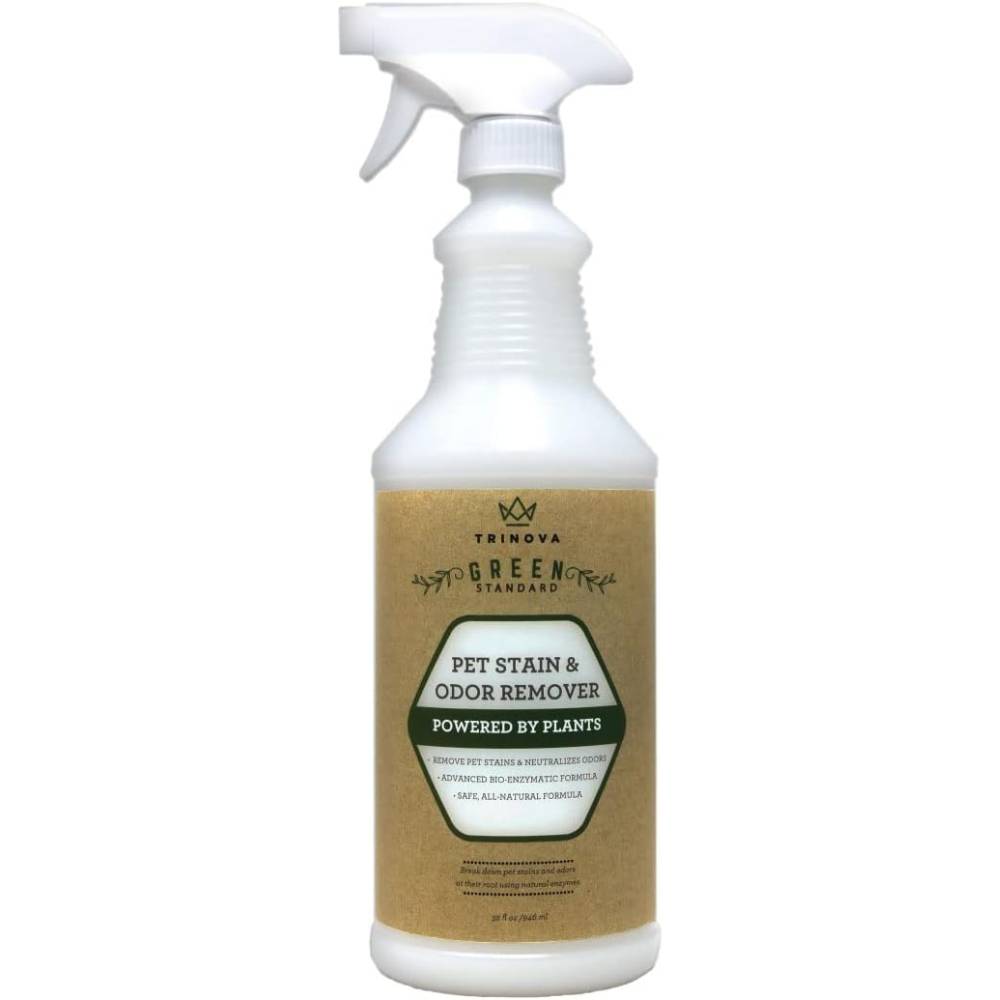
| Bottle size: | 32 oz, 1 gal |
| Scent: | Contains mint essential oil, but no specific scent is mentioned |
| Suitable for: | Water-safe surfaces |
TriNova’s Pet Stain & Odor Remover is one of the pricier options, but it has received mostly excellent reviews from users. It’s formulated with natural ingredients, which means no harsh chemicals and it can be used on water-safe surfaces like rugs, carpets, and upholstery.
It’s also designed for quick and efficient use—according to the instructions, you simply spray, wait for up to 5 minutes, then blot the area with a paper towel. This makes it a good option for fresh stains, though you may need to repeat the process a few times for older stains.
No specific scent is mentioned, but some users mentioned it smells quite strong, so you might not like it if you’re sensitive to strong fragrances. On the other hand, some loved the scent.
- Formulated with natural, plant-based ingredients
- Powerful formula
- Highly reviewed
- Pricey
- The scent might be too strong for some
4. Simple Solution Pet Stain & Odor Remover
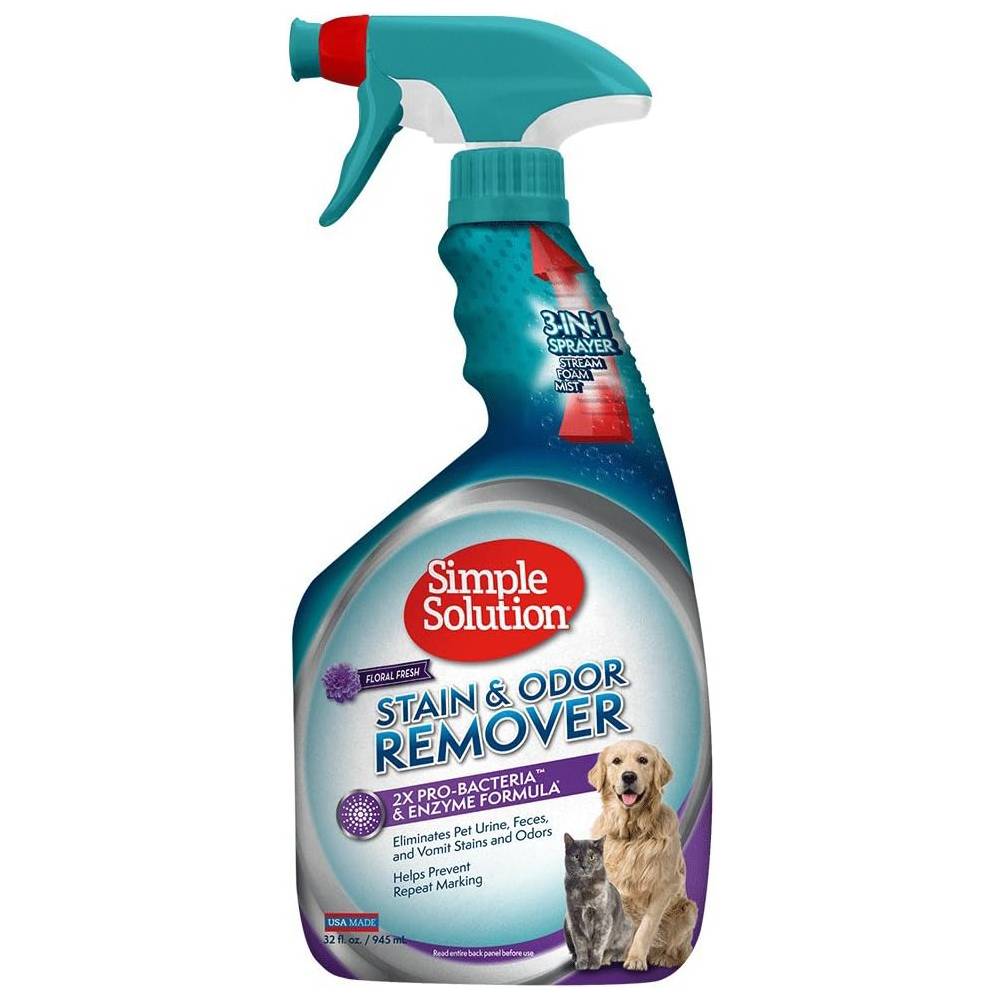
| Bottle size: | 32 oz, 1 gal |
| Scent: | Floral |
| Suitable for: | Upholstery, clothes, fabrics, bedding, water-safe surfaces |
The USA-made, alcohol-based Simple Solution Pet Stain & Odor remover is an affordable, highly-reviewed enzyme spray that can be used on a variety of water-safe surfaces. It uses the 2X Pro-Bacteria & Enzymes formula for breaking down stains and neutralizing odors, and the spray nozzle has three functions—mist, foam, and stream, and each function targets different problems (foam for especially tough, embedded stains, for example).
User reviews praise this product’s functionality and efficacy, with many deeming it an excellent product overall. On the downside, some weren’t keen on the scent and described it as “overpowering”, but others loved it.
- Inexpensive
- Made in the USA
- Three-in-one nozzle function
- Some may find the scent overpowering
- Not suitable for use on wool or leather
5. Shop Care Super Enzyme Pet Urine & Odor Destroyer
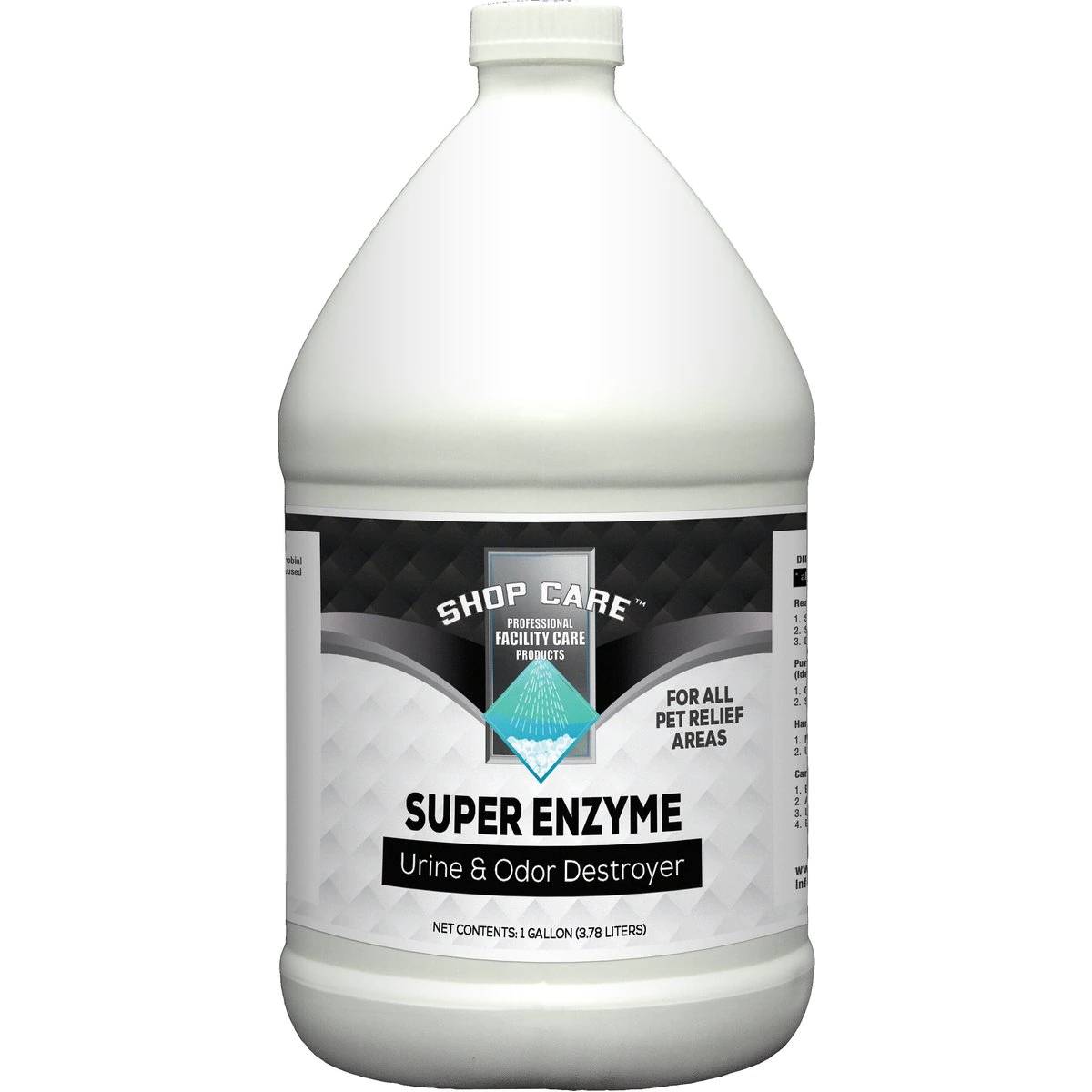
| Bottle size: | 1 gallon, various other sizes available up to 5 gal |
| Scent: | None mentioned |
| Suitable for: |
Bedding, furniture, carpet, grooming salons, pet boarding facilities, shelters, pavements, public pet relief areas, trash cans & more
|
If a standard spray bottle simply won’t be enough, either for professional or home use, the Super Enzyme Urine & Odor Destroyer by Shop Care could be worth considering. This product comes in a wide variety of bottle sizes, ranging from 32 ounces to 5 gallons, and you can purchase the bottles in bundles of one or two. It’s very versatile and could be a good option for those who own facilities like shelters or boarding homes for cats.
User reviews for this product are largely positive, though some might prefer a different scent as it’s described as being quite strong. In addition, it’s pretty pricey compared to some of our other picks.
- Good for heavy-duty cleaning
- Good for both home and professional use
- Comes in various bottle sizes
- Pricey
- Might have a strong scent
6. Nature’s Miracle Dual-Action Stain & Odor Remover Hard Floor Cleaner
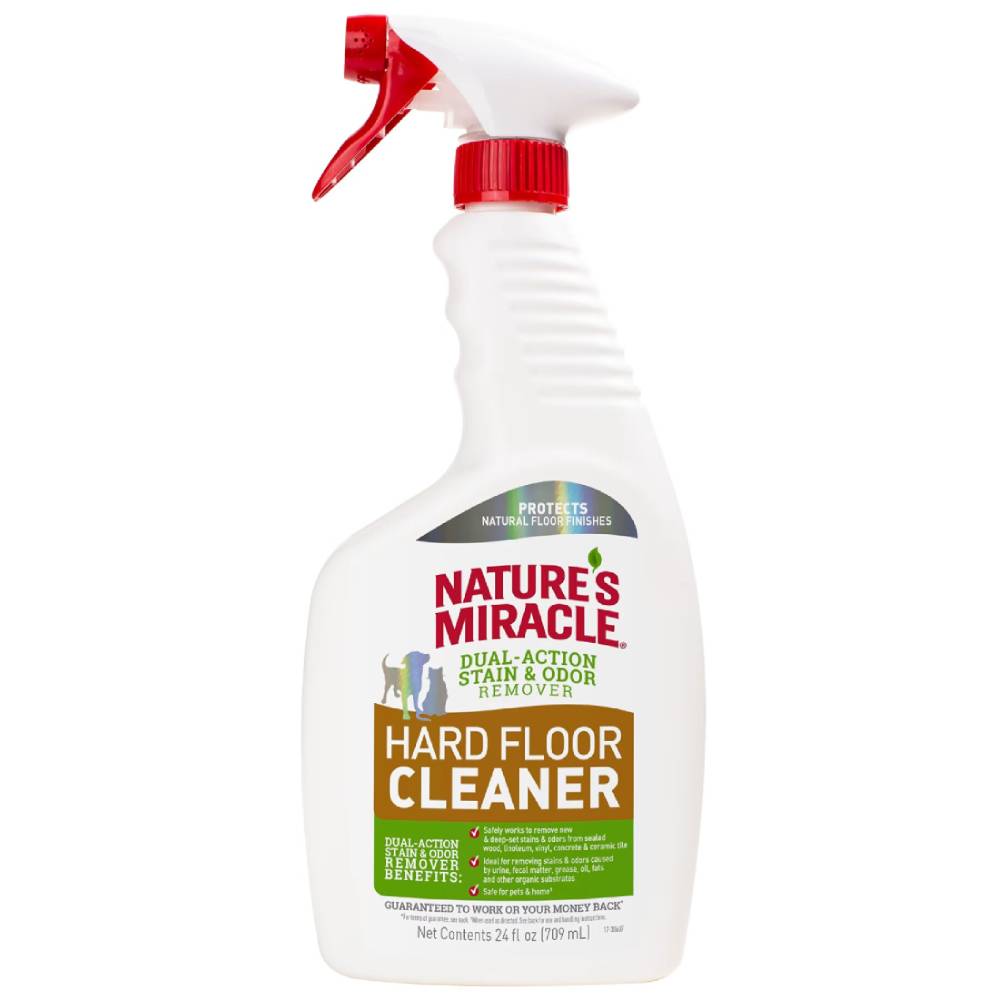
| Bottle size: | 24 oz |
| Scent: | None mentioned |
| Suitable for: | Hard floors |
Using certain products on hard floors can be nerve-wracking, so, if this is a problem for you, take a look at Nature’s Miracle Dual-Action Hard Floor Stain & Odor Remover. Made with bio-enzymatic agents and designed to protect your floor’s finish, this product is for linoleum, vinyl, ceramic tile, concrete, and sealed-wood floors.
Rinsing is not required—all you need to do is soak up excess liquid, apply the product, and then wipe the area. Satisfied customers have said that this stain and odor remover does a great job of eliminating smells without damaging hardwood floors. That said, some were disappointed with its stain-removal power.
- Doesn’t damage hardwood floors
- Effectively neutralizes odors
- No rinsing required
- Some customers say it doesn’t effectively remove stains
7. Angry Orange Stain Remover Enzyme Cleaner
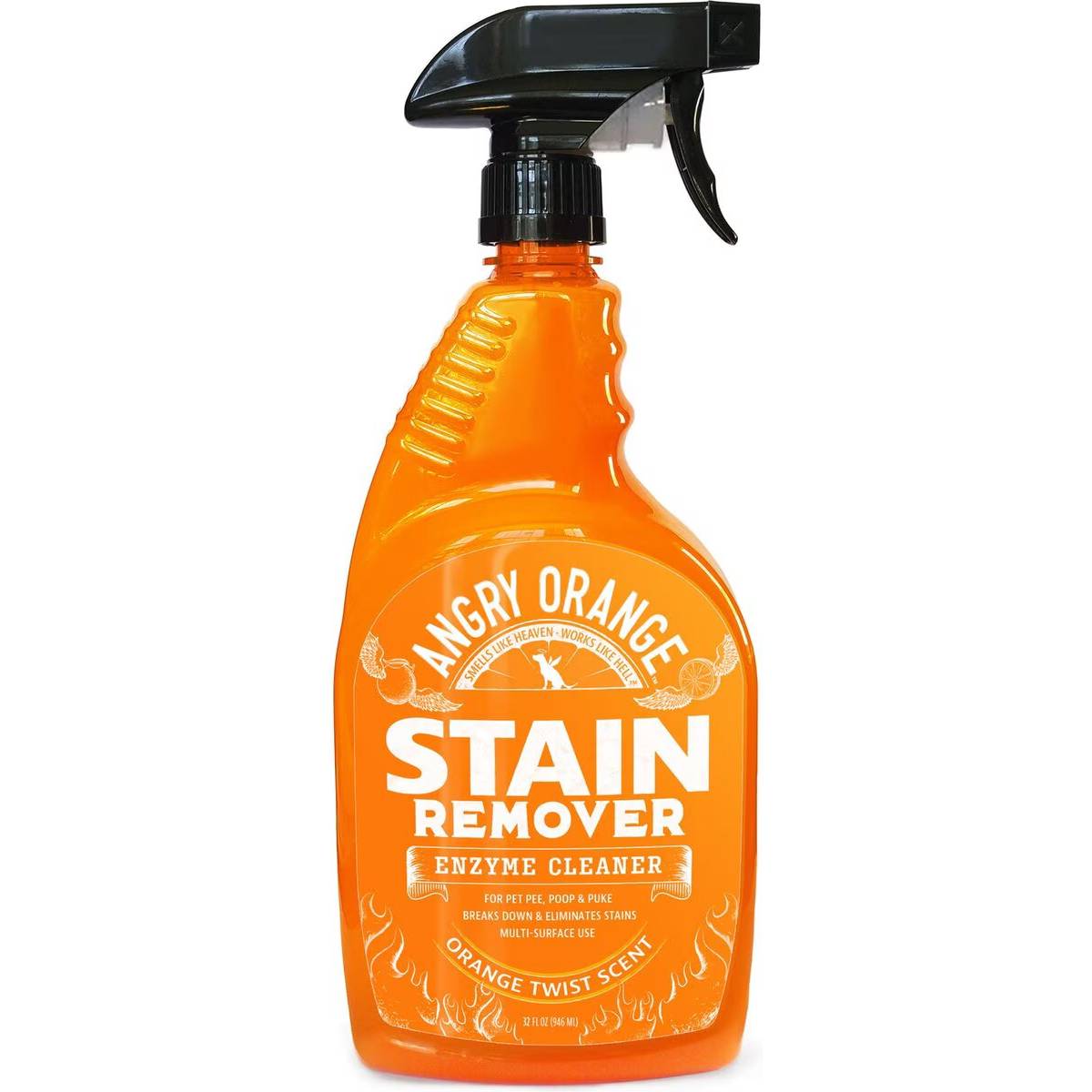
| Bottle size: | 32 oz |
| Scent: | Orange |
| Suitable for: |
Carpets, wood floors, furniture, pet living areas, litter boxes, tile, fabric, non-leather furniture, turf
|
For those who are fans of a sweet, citrusy scent, the Angry Orange Stain Remover spray is formulated to remove tough stains, particularly those left behind by urine, poop, and vomit.
It’s made in the USA, is free of sulfates, peroxide, phthalates, parabens, and bleach, and is ideal for use on a wide variety of surfaces including wood floors. This makes it well worth considering for those looking for a multipurpose cleaner that can tackle various surfaces without damaging them (a spot test is still recommended, nevertheless).
As for this product’s reviews, many love the orange scent and have had an overall good experience with its stain-removal power, but some have said that it leaves behind a “lingering” scent that isn’t too pleasant. It’s also one of the more expensive options.
- Orange scent
- Targets tough stains
- Free of bleach, sulfates, peroxide, parabens, and phthalates
- Can’t be used on leather
- May leave a lingering smell
8. Rocco & Roxie Supply Co. Professional Strength Stain & Odor Eliminator
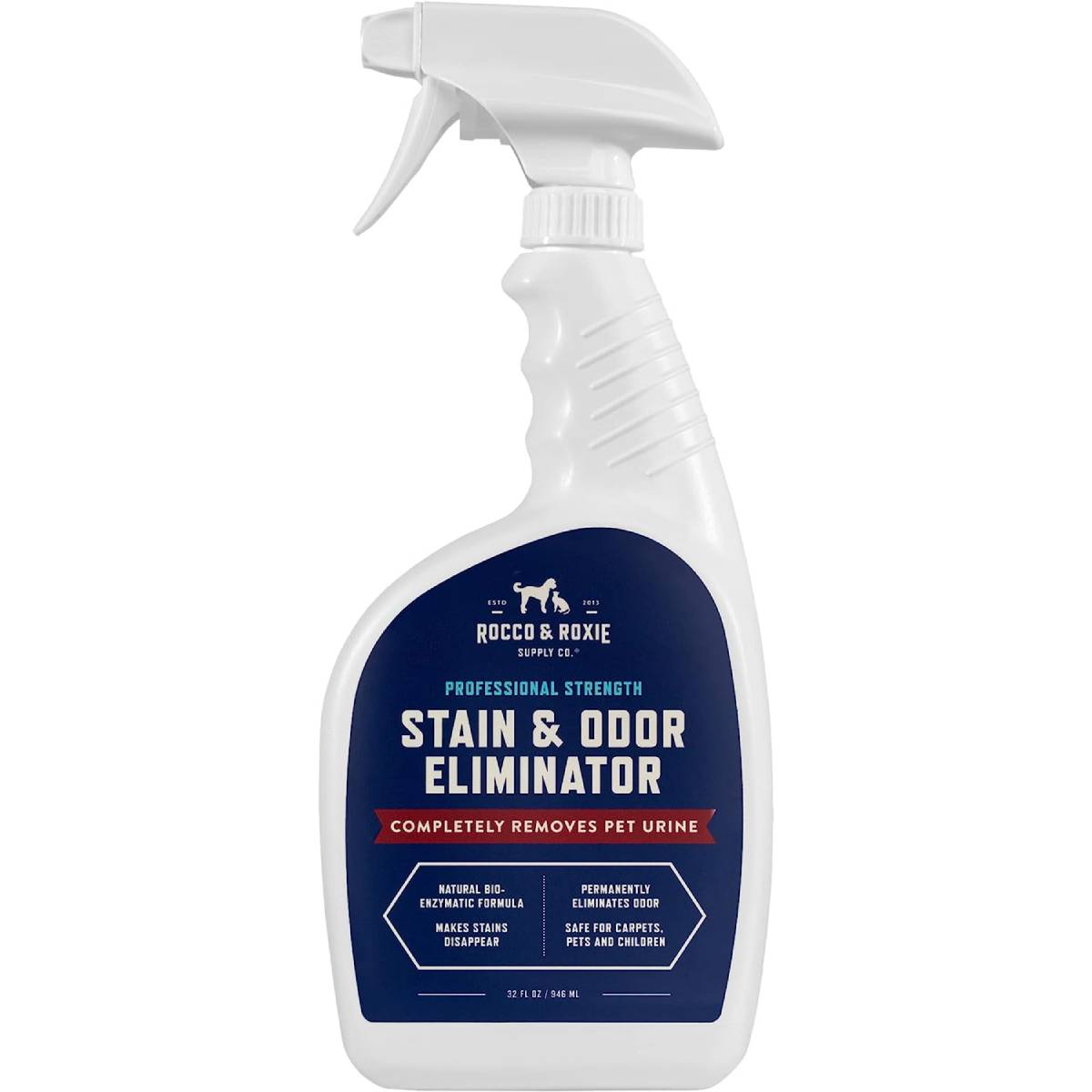
| Bottle size: | 32 oz, 1 gal |
| Scent: | Fresh |
| Suitable for: |
Carpets, hardwood floors, litter boxes, carriers, clothes, furniture, tiles, artificial grass & more
|
The Rocco & Roxie Supply Co. Professional Strength Stain & Odor Eliminator is a USA-made product that has received a large number of positive reviews from customers, with particular praise targeted at how effectively it removes stains and odors without leaving an unpleasant, chemical-like scent. On the other hand, some find the scent a tad overwhelming, while others say it doesn’t remove stains well.
This is another product that’s worth considering for those who want to get to work on multiple types of surfaces, including hardwood floors and outdoor areas. Though water-based, it may even be suitable for use on leather furniture, as Chewy explains in its customer questions section that this has worked for “many customers”.
- Can be used on a wide variety of surfaces
- Made in the USA
- Environmentally friendly
- Some may find the scent overwhelming
- Didn’t remove stains for some customers
9. Simple Green Cat Pet Stain & Odor Remover
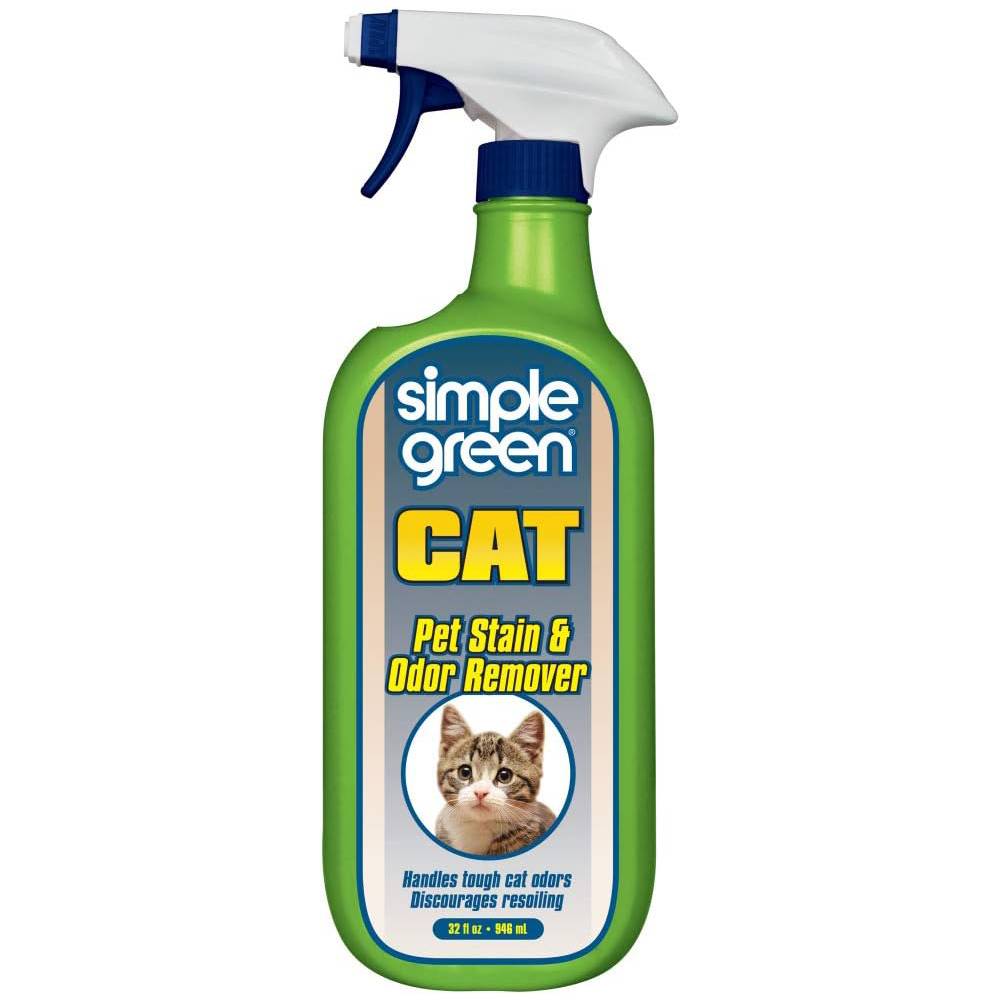
| Bottle size: | 32 oz |
| Scent: | None mentioned |
| Suitable for: |
Upholstery, carpets, rugs, carriers, bedding, finished wood, curtains & drapes, & more
|
One of our most affordable recommendations is the Simple Green Cat Stain & Odor Remover. To use it, you need to spray it on the affected area after soaking up excess liquid (or removing vomit, feces, etc.) and then scrub with a brush or cloth before vacuuming when dry (if applied to carpets). It can be applied to many different surface types, but not velvet, silk, or leather.
Positive user reviews indicate that this is an effective and pleasant-scented product, but the fact that you have to scrub this product onto the area may be inconvenient for those looking for a no-scrub option.
- Affordable
- Designed for both new and old stains
- May discourage remarking
- Scrubbing required
10. Sunny & Honey Pet Stain & Odor Miracle
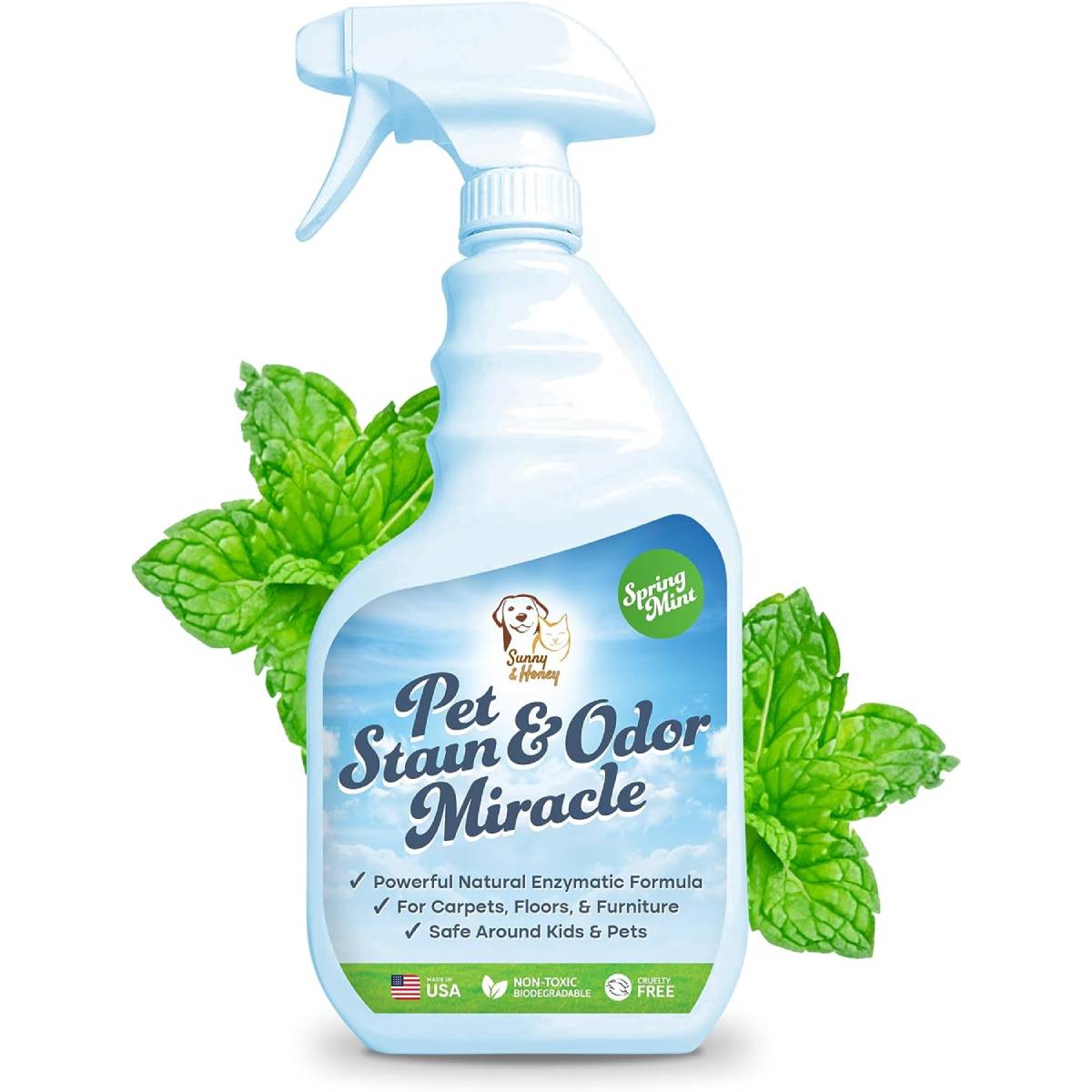
| Bottle size: | 32 oz, 1 gal |
| Scent: | Spring mint |
| Suitable for: | Upholstery, floors, carpets, furniture |
For fans of a nice minty scent, this could be the enzyme cleaner you’re looking for, though you can buy this product in other scents—light lavender and fall spice. It’s made in the USA with a bio-enzymatic formula, essential oils, and non-toxic ingredients, and it’s biodegradable, so is an all-around environmentally friendly choice.
According to positive user reviews, this product has a pleasant scent and eliminates smells rather than simply masking them, though some said they had to use a fair bit of it to make this happen. It’s also relatively expensive compared with some others on this list.
- Minty scent
- Environmentally friendly
- Largely positive reviews
- Pricey
- Some customers had to use extra for best results
Buyer’s Guide: Finding the Best Cat Urine & Odor Remover
There are so many enzyme cleaners on the market that it can be hard to know which one to purchase. Fortunately, you can look to see if a cleaner fits certain criteria to decide whether or not it will be suitable for your situation.
The first and most important thing to check for is if it’s pet-safe and non-toxic. Of course, you should never directly spray your cat with an enzyme cleaner, but pet enzyme cleaners should be safe to use around pets when used properly. Strong or chemical-based products, however, may not be, so it’s best to stick to a specially formulated pet enzyme cleaner.
The next thing to assess is how much of a product you need. If accidents are infrequent or you’ll just be using the product at home, a standard, 32-ounce bottle will likely be enough. If you run an establishment like a cat boarding facility or a grooming salon, you may need to crack out the big guns—bottles with a gallon of product or more.
When it comes to scent, some people aren’t picky, whereas others are sensitive to certain kinds of fragrances. Look for a product that isn’t going to make you gag every time you use it—checking user reviews online can give you an idea of how a product truly smells.
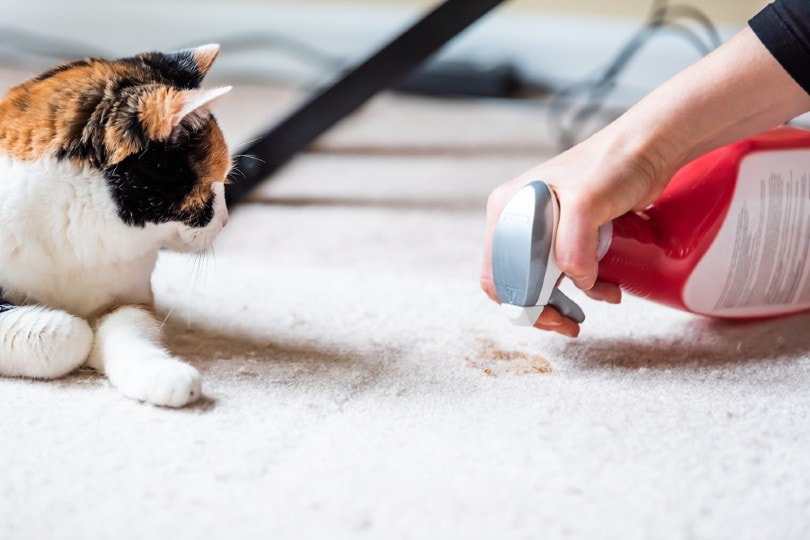
Finally, there’s the price to factor in. We’re not going to lie, some enzyme cleaners are downright expensive. If your situation isn’t urgent and an expensive enzyme cleaner isn’t the only one left on the shelf, we recommend shopping around online to see if you can save a few pennies. Some highly-reviewed enzyme cleaners come in at under $10 and will last just as long.
Before we head to the conclusion, we’d just like to mention that if your cat is peeing frequently around your home, there may be a medical reason behind it, so it’s best to get them checked by a vet.
Conclusion
To recap, we selected the no-nonsense but powerful Advanced Bio-Enzyme Pet Stain & Odor Eliminator by Hepper as our best overall urine and odor remover. In second place as our budget buy is the two-pack of OUT! PetCare Advanced Stain & Odor Remover, which comes with an affordable price tag.
Finally, we’ve got TriNova’s Pet Stain & Odor Remover, which is quite pricey but natural and has received glowing reviews for the most part, as our premium choice. We hope these reviews have helped you decide on the perfect cleaner to deal with your kitty’s little accidents.
See also:
- How to Find Cat Urine Without a Blacklight: 5 Simple Methods
- How to Get Cat Urine Smells & Stains Out of Shoes: 4 Simple Tips
Featured Image Credit: Pixel-Shot, Shutterstock
Contents
- A Quick Comparison of Our Favorites of 2024
- The 10 Best Cat Urine & Odor Removers
- 1. Hepper Advanced Bio-Enzyme Pet Stain & Odor Eliminator – Best Overall
- 2. OUT! PetCare Advanced Stain & Odor Remover (2-Count) – Budget Buy
- 3. TriNova Pet Stain & Odor Remover
- 4. Simple Solution Pet Stain & Odor Remover
- 5. Shop Care Super Enzyme Pet Urine & Odor Destroyer
- 6. Nature’s Miracle Dual-Action Stain & Odor Remover Hard Floor Cleaner
- 7. Angry Orange Stain Remover Enzyme Cleaner
- 8. Rocco & Roxie Supply Co. Professional Strength Stain & Odor Eliminator
- 9. Simple Green Cat Pet Stain & Odor Remover
- 10. Sunny & Honey Pet Stain & Odor Miracle
- Buyer’s Guide: Finding the Best Cat Urine & Odor Remover
- Conclusion


